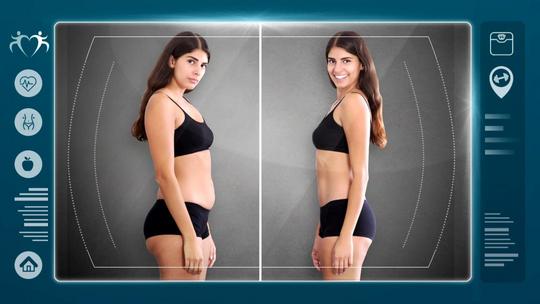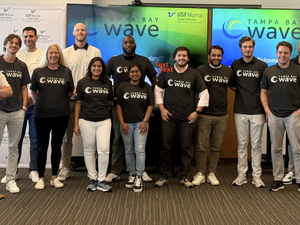
AI, AR, VR, IoT. High-tech acronyms are everywhere.
Artificial intelligence algorithms curate our news feeds. Augmented reality software shows us what we look like with bunny ears and anime eyes. The Internet of things keeps all our gadgets interconnected.
Tampa-based startup EnvisionBody hopes to leverage these emerging technologies, particularly AI and AR, to help people reach health and fitness goals by letting users see “enhanced” images of themselves in real-time video. The goal is to motivate users through positive reinforcement.
A decade ago, cellphones were just cellphones. Now they’re supercomputers, packed with enough processing power to let platforms like Snapchat and Instagram overlay intricate animations and morph our faces.
EnvisionBody founder and CEO Salina Ray wants to use those same techniques for less whimsical ends. By capturing a user’s image, running it through an AI application, and showing the user a leaner (or beefier) version of themselves, Ray thinks people will feel compelled to continue working toward their fitness goals.
“This isn’t just an overlay of cartoon caricature,” she said. “The user’s actual image will change. I see this ideally used as a form of exercise motivation, but it doesn't have to be used with exercise. If someone wanted to see their image in an enhanced form, whether that's more muscular or thinner, they're able to do that by simply interacting with a computer and a camera.”
Other applications may include providing patients before and after comparisons for gastric and cosmetic surgeries.
Ray points to two studies as evidence that body image and motivation can influence a person’s health, diet and fitness regimes. In one study, normal weight adolescents who viewed themselves as overweight experienced larger weight gains into young adulthood than those who saw themselves as normal weight. In another study, increased expectations placed on runners resulted in increased performances. However, there have yet to be studies conducted on whether an image-altering application can encourage positive health changes.
In the past few years, apps like Snapchat and Instagram have faced criticism for promoting unattainable body images through their image filters. Ray said preventing unhealthy experiences was baked into her app from the beginning.
“It’s actually written in the very first patent I filed,” she said. “As a safety precaution, we have a stop point based on a user’s body mass index that will prevent their image from becoming too thin or large. This ensures that the image produced remains within a healthy limit.”
Ray began filing patents for EnvisionBody in 2013 and has secured three approvals with one patent pending. Earlier this year she met with software developer Philippe Lewicki, whose company AfterNow specializes in AR and showed interest in developing EnvisionBody’s software. Ray is seeking $250,000 in investments to develop software ready for beta testing. She estimates that a complete buildout will cost $1 million.









